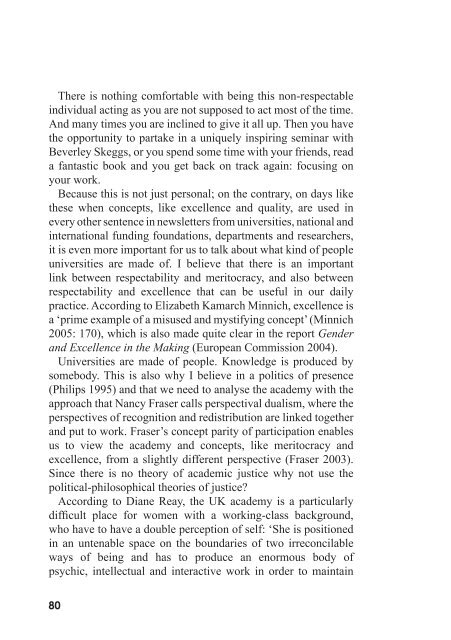Thinking with Bevereley Skeggs - Stockholms universitet
Thinking with Bevereley Skeggs - Stockholms universitet
Thinking with Bevereley Skeggs - Stockholms universitet
- No tags were found...
You also want an ePaper? Increase the reach of your titles
YUMPU automatically turns print PDFs into web optimized ePapers that Google loves.
There is nothing comfortable <strong>with</strong> being this non-respectableindividual acting as you are not supposed to act most of the time.And many times you are inclined to give it all up. Then you havethe opportunity to partake in a uniquely inspiring seminar <strong>with</strong>Beverley <strong>Skeggs</strong>, or you spend some time <strong>with</strong> your friends, reada fantastic book and you get back on track again: focusing onyour work.Because this is not just personal; on the contrary, on days likethese when concepts, like excellence and quality, are used inevery other sentence in newsletters from universities, national andinternational funding foundations, departments and researchers,it is even more important for us to talk about what kind of peopleuniversities are made of. I believe that there is an importantlink between respectability and meritocracy, and also betweenrespectability and excellence that can be useful in our dailypractice. According to Elizabeth Kamarch Minnich, excellence isa ‘prime example of a misused and mystifying concept’ (Minnich2005: 170), which is also made quite clear in the report Genderand Excellence in the Making (European Commission 2004).Universities are made of people. Knowledge is produced bysomebody. This is also why I believe in a politics of presence(Philips 1995) and that we need to analyse the academy <strong>with</strong> theapproach that Nancy Fraser calls perspectival dualism, where theperspectives of recognition and redistribution are linked togetherand put to work. Fraser’s concept parity of participation enablesus to view the academy and concepts, like meritocracy andexcellence, from a slightly different perspective (Fraser 2003).Since there is no theory of academic justice why not use thepolitical-philosophical theories of justice?According to Diane Reay, the UK academy is a particularlydifficult place for women <strong>with</strong> a working-class background,who have to have a double perception of self: ‘She is positionedin an untenable space on the boundaries of two irreconcilableways of being and has to produce an enormous body ofpsychic, intellectual and interactive work in order to maintain80
















